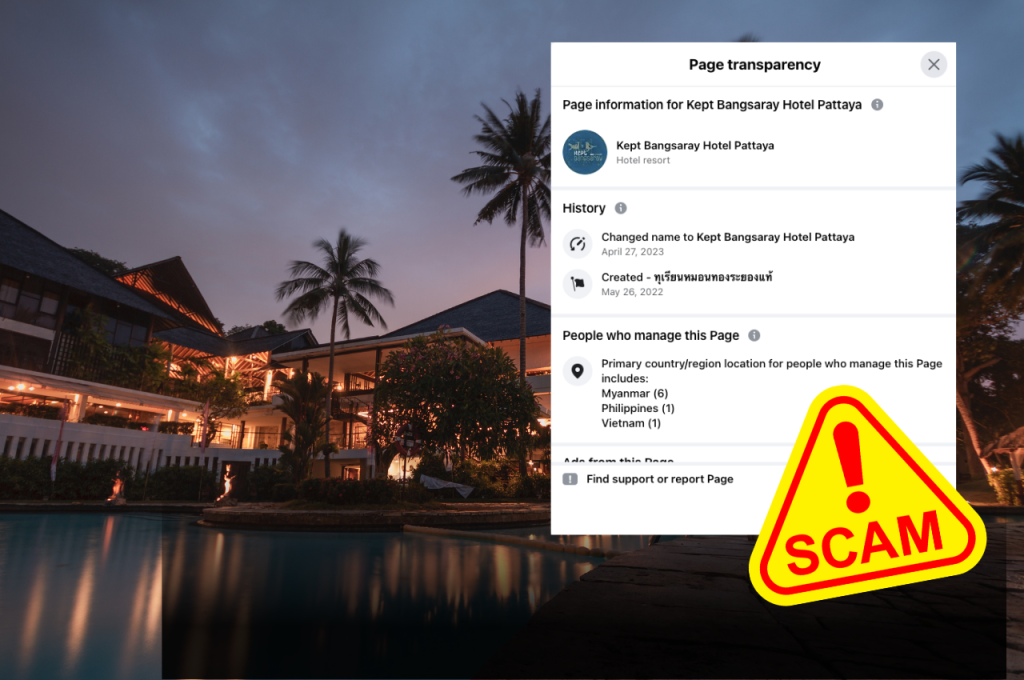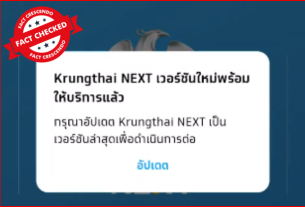
As social media connects the world more than ever, scammers use various online platforms to deceive unsuspecting individuals. Recently, there have been warnings about a new form of fraud, in which scammers create Facebook pages impersonating famous hotels throughout Thailand, luring customers into making direct reservations and transferring money directly to these fraudsters.
The Emergence of Fake Facebook Pages
Like most businesses, Facebook is a primary channel for communicating with customers and promoting products for sale. However, scammers have taken advantage of this platform by creating fake Facebook pages for well-known hotels. They use information from the hotels’ genuine websites and actual customer images and video reviews to make the counterfeit pages appear more authentic. These fake pages often closely resemble the real ones, with the only noticeable difference being fewer followers. Consequently, users may need help differentiating between real and phoney hotel pages on Facebook. (See some of the warnings from the hotels here, here, and here)

Scammers typically post promotions at significantly lower prices than the actual website. They may claim to offer discounts or special packages to entice customers to make a reservation through their page quickly. When interested individuals inquire through messaging, scammers pretend to be the page administrator or hotel staff to communicate and persuade customers to transfer booking fees.
Observations and precautions to take:
1. Check the “Page Transparency” Section to verify if it is a genuine page.



Unauthentic pages pretending to be hotels are often recently created and may have changed their names. Some may even have administrators located in different countries.
2. Suggesting customers to make payments through a personal account, not in the hotel’s name.
Imposters often ask customers to transfer money to a personal account that is not under the name of the hotel or company. They may also ask for the total amount in advance for room reservations.
3. Agents use unnatural/unprofessional language
In certain scenarios, fraudulent individuals may use inaccurate spelling and confusing responses. Such behaviour may suggest that they need to be more authentic or professional hotel representatives.
How to Stay ahead of scams!
We have compiled several steps to help protect you from falling victim to online hotel booking scams:
Book through reputable websites: Use trustworthy online accommodation booking websites with strict security measures and often offer guarantees and assistance in case of booking problems, such as Agoda.com or Booking.com, or book directly through the hotel’s website. Make sure to carefully check the URL to confirm that you are on the hotel’s official website.
Avoid sharing sensitive information: Do not share sensitive information such as credit card numbers, ID card numbers, passport numbers, or personal information via unsecured communication channels like Facebook Messenger or other suspicious messaging platforms.
Check information with the hotel’s official channels before transferring money: If you must book through the hotel’s Facebook page, verify the page’s credibility through the methods mentioned above or check with the hotel’s other official channels such as phone or email listed on their website.
Follow us and stay up to date with our latest fact checks.
Facebook | Twitter | Instagram | LINE | TikTok

Title:Scammer Alert! Fake Facebook Pages of Famous Thai Hotels Targeting Innocent Customers
By: Cielito WangResult: Explainer




